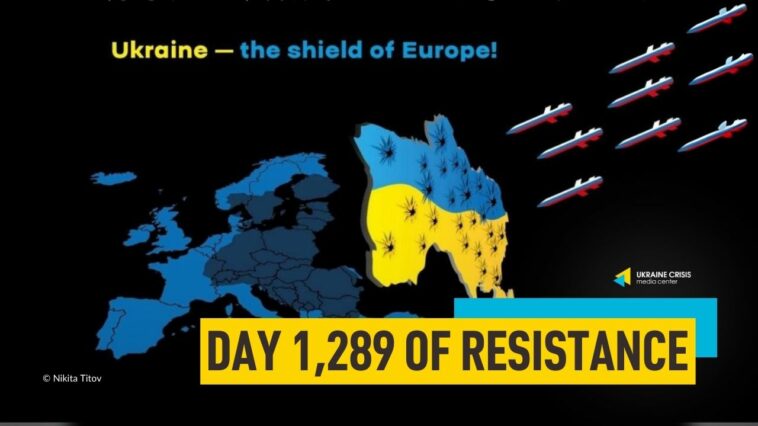Ukraine’s territorial concessions will open way for Putin to attack Europe, Zelenskyi says. The Coalition of the Willing meets in Paris. The UK uses frozen Russian assets to fund more than £1 billion worth of military support for Ukraine.
Ukraine’s territorial concessions will open way for Putin to attack Europe, Zelenskyi says
Territorial concession that Ukraine will not accept, would only result in Putin using the seized land as a foothold to stage an attack on Europe if the latter doesn’t become strong, Ukrainian President Volodymyr Zelenskyi told French magazine Le Point in an interview published on Wednesday. We’ve translated excerpts from the conversation that the media published in Ukrainian.
“Some media say that if Ukrainian soldiers retreat from eastern regions of our country, it will restore peace there. But this is not true. Putin seized Crimea to then use it as a foothold to encircle the south. In 2014, he captured some eastern lands of our country to use them as a foothold to fully occupy those regions. If tomorrow we somehow retreat from Donbas, which is not going to happen, we will open to Putin unprotected areas close to the city of Kharkiv that has 1.5 million residents. He would also seize the industrial center of Dnipro. It would open new possibilities for him,” Zelenskyi said.
European nations should rescale their vision of the situation and imagine what would have happened had Putin succeeded in his initial plan of capturing all of Ukraine, he added.
“Had Putin succeeded in seizing all of our country, he would have used it in the same way: as a foothold. Whether he will do it or not depends on how strong Europe will be. If Europe is strong, he will likely do nothing, but if it is weak, it will suffer from Russia’s actions,” Zelenskyi said.
The distance between Moscow and Paris is less than 3,000 kilometers, he added.
“The missiles that Russia is using today against Ukraine have a range of 2,500 kilometers. We also have missiles that can fly 3,000 kilometers. The war encourages technological development here, in Europe, but also in Russia. Such technological development puts an end to far-off wars. Believe me, two years from now the Russians will have a lot of missiles with a range of 5,000 kilometers, and so will we. The sea will not protect anyone, and neither will the ocean. Seen from this perspective, the weapons that Russia is using today are not that different from nuclear delivery systems,” Zelenskyi said.
Ukraine’s fate will decide how much the war will affect Europe and where its eastern borders will be drawn, he added.
“If Ukraine falls, the border will be in Poland or even in Germany. Europe was once divided like that. The eastern border of West Germany was the boundary of the Western world. Today everything depends on us. How far will we let Russian ambitions go?” Zelenskyi asked.
Coalition of the Willing meets in Paris
More than 30 leaders from the Coalition of the Willing met in Paris and online on Thursday to finalize security guarantees for Ukraine. Among those present in person were six European leaders, including French President Emmanuel Macron, Belgian Prime Minister Bart De Wever, Dutch Prime Minister Dick Schoof, Danish Prime Minister Mette Frederiksen, Finnish President Alexander Stubb and Polish Prime Minister Donald Tusk; Ukrainian President Volodymyr Zelenskyi, European Commission President Ursula von der Leyen and European Council President António Costa. The rest joined virtually.
Slovakia, Hungary and Malta did not attend the summit.
Head of the Office of the President of Ukraine Andriy Yermak and head of Ukraine’s Security and Defense Council Rustem Umerov met with U.S. special envoy Steve Witkoff who also briefly attended the opening session.
After the meeting, the leaders held a phone call with U.S. President Donald Trump.
Macron said ahead of the meeting that preparatory work on the security guarantees had been done and should now be approved at political level.
Earlier this week, German Chancellor Friedrich Merz said there are no concrete plans for military action in relation to security guarantees for Ukraine, “at least not in Germany,” he said, according to the DW.
UK uses frozen Russian assets to fund more than £1 billion worth of military support for Ukraine
Money raised from immobilized Russian assets has paid for more than £1 billion of weapons and military support, purchased by the UK on behalf of Ukraine, British Defence Secretary, John Healey, announced during a visit to Kyiv on Wednesday, the UK government said.
This has enabled the delivery of hundreds of thousands of rounds of artillery ammunition, hundreds of air defense missiles, spare parts, and new support contracts to help maintain and repair its equipment and vehicles.
According to the statement, Healey said: “The UK is stepping up our military support to help Ukraine defend itself in today’s fight against Putin’s illegal invasion, while working hard to secure peace tomorrow through the Coalition of the Willing. More than £1 billion of military support for Ukraine has now been paid for by immobilized Russian assets, while we have accelerated deliveries of vital kit and equipment over the last 50 days into the hands of Ukrainian warfighters.”
UK support provided in the last 50 days includes 4.7 million rounds of small arms ammunition for Ukraine’s soldiers, 60,000 artillery shells, rockets, and missiles, more than 2,500 drones, more than 200 electronic warfare systems, 100 light weapons, 30 vehicles and additional counter-drone and air defense equipment.
“The UK remains committed to securing a just and lasting peace in Ukraine, with £4.5 billion being spent on military support to Ukraine this year. The Government has provided a £2.26 billion loan by the UK to Ukraine through the Extraordinary Revenue Acceleration fund, which is being repaid using money raised from the proceeds from immobilized Russian assets,” the statement reads.

